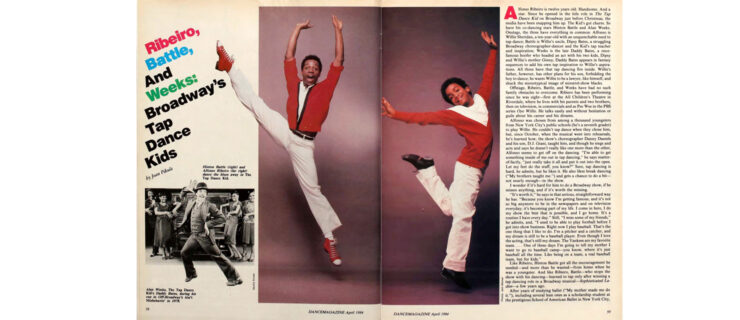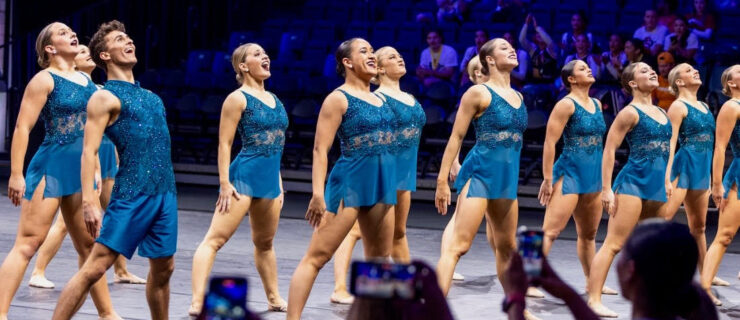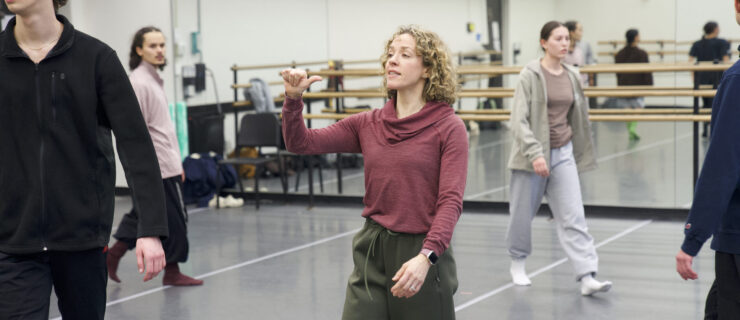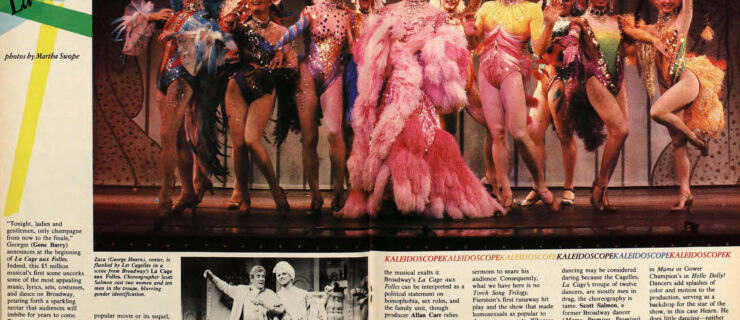Lost Your Job? That's Great!
Like looking down the first plunge of a roller coaster, or being on an elevator when the wires are cut—that’s how Holley Farmer describes the sensation of learning in February 2009 that her contract would not be renewed after 13 blissful years with the Merce Cunningham Dance Company. The executive director told her the decision was based on artistic reasons. But the late choreographer himself let her know privately that letting her go was necessary for the company to stay afloat financially. (Two other lead dancers were also let go.) To Farmer, the rationale didn’t really matter. “I was in torment,” she says. “I felt so betrayed.”
Fast-forward to September 2009, when Farmer debuted a principal role in Twyla Tharp’s new musical Come Fly With Me in Atlanta (now titled Come Fly Away; see cover story). “It’s the first time I’ve played a character in over a decade,” she says. “It took a lot for me to step onstage wearing a blue satin dress and a boa!” Farmer credits Tharp for challenging her to expand her artistic horizons—something she never expected to do at this advanced stage in her career. “I had to let go of that identity as a Cunningham dancer. It was through her mentoring that I was able to see a differentreality for myself.”
Farmer believes getting fired was a blessing in disguise. “After working with Merce all those years, I defined myself that way and felt I was defined by it,” she says. “Now I realize that Merce was just part of my journey.”
With the recession causing budget cuts across many companies, layoffs are an ever-present anxiety for dancers today. But even in sunnier economic times, there’s always a chance you could lose your job. As scary as that seems, those who’ve been through it often find it instills resilience and exposes a side of themselves they never knew existed. The key is being open to unforeseen opportunities and trusting the age-old adage that everything happens for a reason.
That’s the mantra of Kansas City Ballet member Deanna Doyle. She’s currently in her sixth season with the company, but back in 2003—after being hired and then abruptly fired by Karole Armitage (who had not yet founded Armitage Gone! Dance)—she feared she would never dance professionally. Doyle recalls how her “whole world shattered” when she got the news that her contract was being terminated due to a lack of funds. The experience at such a young age (she was 22 and had just graduated from the University of Kansas) was emotionally devastating. Luckily, the relationship she’d cultivated with the director of the dance department at her alma mater paid off. Even though she was no longer a student, he helped her land the lead in a ballet being choreographed by William Whitener, artistic director of Kansas City Ballet, who soon offered her a company spot.
Now Doyle sees being laid off in a whole new light. “I’m actually glad it happened because it’s such a better fit for me,” she says of KCB. “I grew up studying ballet, tap and jazz. If I had stayed with Karole, I wouldn’t be able to dance Dewdrop in The Nutcracker and The Cowgirl in Rodeo.” Add to that a principal role in Armitage’s Arctic Song, a new work the choreographer set on Kansas City Ballet (and personally cast) last May. As Doyle puts it, “In this company, I can do it all.”
Of course, finding a new job isn’t always so easy. When Lindsay Purrington was let go from Pennsylvania Ballet last February after two and a half years in the corps, she dreaded getting back on the audition circuit. “It was difficult to go to so many cattle calls,” she says. “I was one of the oldest people there, and not everyone is looking for experience.” Purrington estimates she sent her resumé, DVDs, and press clippings to a dozen companies before receiving an offer in June from Carolina Ballet, where she had been a founding member in 1998. Today she is a second soloist and thrilled to be performing more than ever before. “It’s great to be part of new works and create roles,” she says. And yet she recognizes how instrumental her previous jobs were in paving the way. “I wouldn’t be the dancer I am now without Pennsylvania Ballet. I grew technically and artistically.”
For Jennifer Goodman, a veteran of the Joffrey Ballet whose contract was not renewed when it expired in June 2009—after 16 years with the company—the transformation was psychological as well as physical. “It’s kind of like going through a breakup,” she says of coming to terms with the decision of Ashley Wheater, who became artistic director in 2007. “I completely understand him wanting to make changes. I represented the old Joffrey.” Still she struggled not to take it personally. Part of what helped her get there was landing a pair of prestigious freelance gigs: She’s been dancing with The Metropolitan Opera in Carmen and Aïda (“There were 300 women at the audition and they picked five—that really boosted my self-esteem”), and the eight-member company BalletX, based in Philadelphia. She also dances with Avi Scher & Dancers in New York. “What I’m loving is that I’m being respected for my age and experience,” she says. She’s adopted a new life philosophy. “I’ve given up on trying to control things. Some people like you and some prefer a different look or style. I used to dwell on what I don’t have. Now I dwell on what I do have.”
She continues: “BalletX is more contemporary than what I’ve done, so it’s fun exploring that.” Goodman was so intent on using this experience to stretch herself as an artist that she auditioned everywhere, from Amsterdam’s Het Nationale Ballet to Cirque du Soleil.
Farmer can relate: “When Twyla first came to me about the role in Come Fly With Me, I was as bemused as anyone. I had to trust her vision for me, because I couldn’t see myself doing what she wanted me to do. It required a huge leap of faith.” Now she’s reaping the rewards of taking that risk. “On a daily basis I get to do movement that fascinates me.”
For these four women, it was a combination of determination, drive, and faith in the future that inspired them to persevere—and catapulted them to a better place. The lesson they learned is that just because a career transition is forced doesn’t mean it can’t be fortuitous. “Anything that happens to you—regardless of whether it was your choice or not—becomes part of your story,” says Farmer. “And this story for me has had a very happy ending.” She pauses, then adds: “And a beginning.”
Elaine Stuart, a former dancer, has worked as an editor at
Modern Bride and Child magazines.




